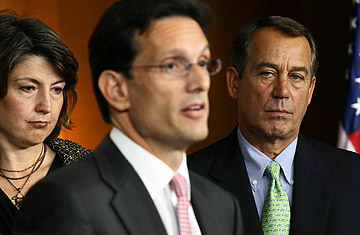
House minority leader John Boehner and Republican Representative Cathy McMorris Rodgers listen as House minority whip Eric Cantor, center, speaks during a Sept. 29, 2010, news conference in Washington
With less than three weeks to go, Republicans are poised for a broad and potentially dramatic political rebound on Nov. 2, likely to recapture the House, win a solid majority of governorships and come very close to recapturing the Senate.
For a party that was floating face down in deep water 18 months ago, this is a remarkable revival. The GOP's immediate problems, in other words, are few. "The threat matrix," chortled one party veteran, "is low."
But while Republicans may see trends worth celebrating early, they still have their worries. Here are three:
1. Past Their Peak?
A number of top GOP consultants said last week that it is possible — not certain, but possible — that the party's fortunes had peaked sometime in late September, perhaps a week or two early for maximum gains. Some of this is normal: Democrats typically get interested in elections much later than Republicans do and some is surely due to Barack Obama's late kick. (Of course, most parties would sell their souls for poor timing like this.)
Several others said overconfidence, not timing, is the GOP's biggest worry now; every time someone makes cocky predictions of huge gains, it only serves to keep Republican voters at home and get more Democrats to the polls. Audible, there-he-goes-again groans could be heard last week when former House Speaker Newt Gingrich predicted a 50-seat gain in the House. Though many of the best number crunchers say that estimate is in line with their own private predictions, they were dismayed that the former House Speaker felt compelled to say it out loud. (Plus, Gingrich's track record is poor: in 1998, he predicted a 30-seat sweep, but instead he lost five and surrendered the Speaker's gavel a few days later.)
2. The Screwup
A few poorly chosen words can knock an untested candidate effectively out of a race. A few misplaced ads can change the contest entirely. And there is so much money sloshing around among private Republican groups (north of $200 million by one estimate) that the biggest danger is that one of the many private, untraceable, political action committees working on the Republicans' behalf will cut an ad that includes untested language or unproven allegations that put otherwise safe contests suddenly into play. A version of this unfolded last week in West Virginia, where the Republican senatorial committee hired a company to produce an ad on behalf of GOP challenger John Raese, which, in turn, put out a casting call asking for "hicky" looking actors who could play West Virginia blue collar voters. Democratic governor Joe Manchin fired back with an ad in which he took target practice on the President's cap-and-trade bill, all the while using the "hicky" controversy to cast his Republican opponent as a carpetbagger.
3. The Continuing Revolt
Top GOP officials are only now really starting to think through what their lives are going to be like with much larger numbers of Tea Party sympathizers in the House and Senate next year: perhaps three or more in the Senate, perhaps several score or more in the House. And many safe Republican members will be worried that the Tea Party will go after them in 2012 should they fail to get with the program. How will the party, which has no recent history of cutting federal spending and entitlements (and, in fact, a history of the opposite) satisfy all those new lawmakers who roar into Washington to do just that? As one longtime Republican consultant put it, "The dog has caught the car. Now it is shaking the bumper and nothing is happening."
All of these are challenges. None are as formidable as rising from the dead in less than two years. But they're challenges nonetheless.
